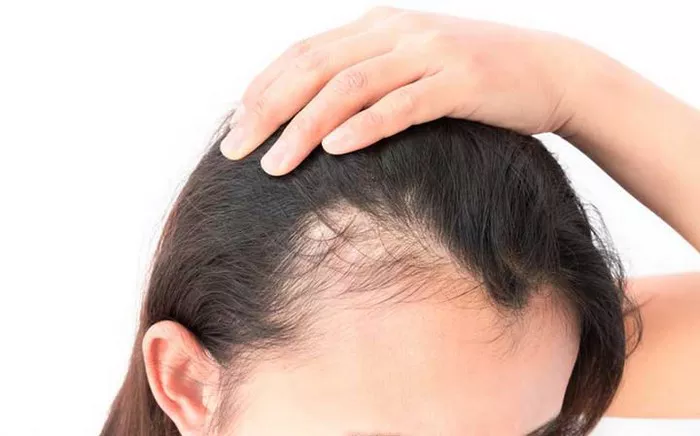Embarking on a diet journey can lead to positive changes in your body, but sometimes it can also result in unwanted side effects like hair loss. The good news is that with the right approach, you can minimize the risk of hair loss while achieving your health goals. In this article, we’ll explore effective strategies to help you maintain healthy, lustrous hair while dieting.
Can Dieting Cause Hair Loss?
Dieting can potentially cause hair loss. Rapid weight loss, extreme calorie restrictions, and imbalanced diets can shock the body, leading to a condition called telogen effluvium. This disrupts the hair growth cycle, causing more hairs to enter the shedding phase. Nutrient deficiencies from restrictive diets can also weaken hair follicles. Prioritizing a balanced diet rich in protein, vitamins, and minerals is crucial to minimize hair loss risks while dieting. Gradual weight loss and consulting healthcare professionals can help prevent this side effect and promote overall hair health.
What are the other bad things about dieting?
While dieting can have positive effects on your health and well-being, there are also potential drawbacks and challenges to be aware of:
1. Nutrient Deficiencies:
Extreme diets or restrictive eating plans can lead to nutrient deficiencies, which can negatively impact your overall health and energy levels. Lack of essential nutrients can also affect your hair, skin, and nails.
2. Metabolic Changes:
Very low-calorie diets can slow down your metabolism over time, making it harder to maintain weight loss and potentially leading to weight gain once you resume a regular diet.
3. Muscle Loss:
Rapid weight loss diets, especially those that lack adequate protein, can result in muscle loss along with fat loss. This can lead to a decrease in strength and overall muscle mass.
4. Disordered Eating Patterns:
Dieting can sometimes lead to unhealthy relationships with food, triggering disordered eating patterns like binge eating, emotional eating, or orthorexia (an obsession with eating “clean” foods).
How to Prevent Diet-Induced Hair Loss?
But actually a few strategies can help you prevent hair loss due to explaining:
1. Prioritize Nutrient-Rich Foods:
A well-balanced diet rich in essential nutrients is crucial for hair health. Ensure you’re getting sufficient protein, vitamins (especially A, C, D, and E), minerals (such as iron and zinc), and omega-3 fatty acids. These nutrients play a significant role in promoting strong and vibrant hair.
2. Gradual Weight Loss:
Avoid rapid and extreme weight loss, as it can shock your body and lead to hair shedding. Aim for a gradual weight loss of 1 to 2 pounds per week, allowing your body to adjust and minimize the risk of hair loss.
3. Stay Hydrated:
Proper hydration supports overall body functions, including hair health. Drink plenty of water throughout the day to keep your hair and scalp nourished and hydrated.
4. Consult a Professional:
Before starting any diet plan, consult a healthcare professional or registered dietitian. They can help design a diet that supports your health goals while providing the necessary nutrients for hair health.
5. Include Protein Sources:
Adequate protein intake is essential for maintaining hair strength. Incorporate lean meats, poultry, fish, eggs, beans, nuts, and dairy products into your diet to ensure you’re getting enough protein.
6. Don’t Skip Meals:
Skipping meals can deprive your body of the nutrients it needs. Ensure you’re eating regular, balanced meals that provide a steady stream of nutrients to support hair health.
See Also: Battling Hair Loss During Period: Strategies for Healthy Hair
What to do if you experience hair loss?
Experiencing hair loss can be concerning, but there are several steps you can take to address the issue. Here’s what to do if you’re facing hair loss:
1. Identify the Cause:
Determine whether the hair loss is temporary or chronic. Factors like stress, hormonal changes, medications, and certain medical conditions can contribute. Consult a healthcare professional or dermatologist for an accurate diagnosis.
2. Review Your Diet:
Ensure your diet includes a balanced mix of nutrients, especially protein, vitamins (A, C, D, E), minerals (iron, zinc), and omega-3 fatty acids. Nutrient deficiencies can contribute to hair loss.
3. Manage Stress:
Stress can trigger hair loss. Incorporate stress management techniques like meditation, yoga, exercise, and relaxation techniques into your routine.
4. Over-the-Counter Treatments:
There are over-the-counter treatments like minoxidil that can help slow hair loss and promote regrowth. Consult a professional before using any medications.
5. Prescription Medications:
Prescription medications such as finasteride may be recommended for certain types of hair loss. A healthcare provider can determine if these are suitable for you.
Remember, it’s essential to consult a healthcare professional before pursuing any treatments. They can guide you toward the most effective strategies for your specific type of hair loss and overall health. Patience is key, as some treatments take time to show results.
Conclusion
Achieving a healthy body through dieting shouldn’t come at the cost of your hair health. By following these practical tips, you can maintain strong and luscious hair while on your journey to a healthier you. Prioritize balanced nutrition, stay hydrated, and consult professionals to ensure you’re making dietary choices that support both your body and your hair’s well-being.


